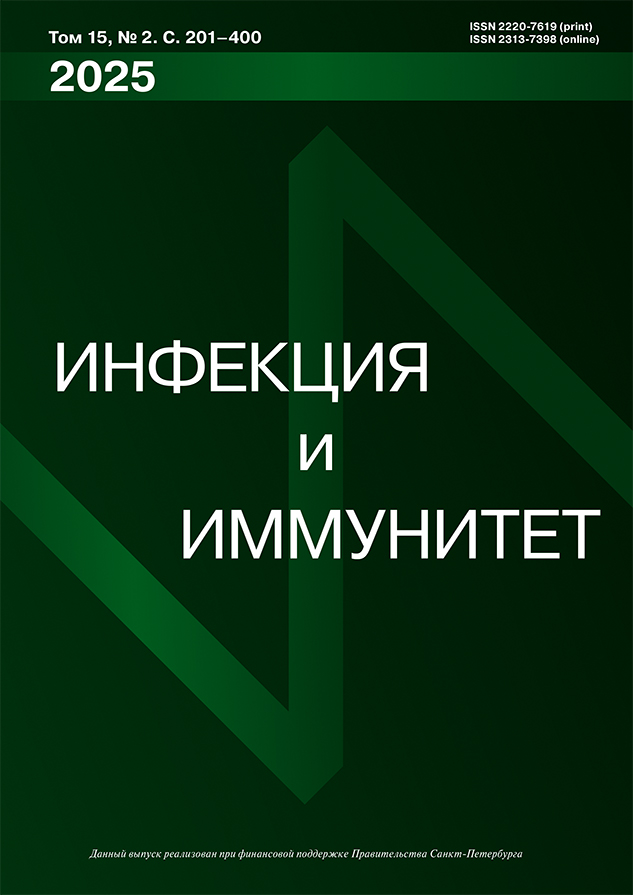Состояние иммунитета к вирусу кори в различных группах населения
- Авторы: Любимова А.В.1, Злоказов М.Д.1,2, Иванова Л.А.2, Арзамасцева Л.Ю.3, Рыжман Н.Н.4, Колосовская Е.Н.1,4, Гумилевская О.П.4
-
Учреждения:
- Северо-Западный государственный медицинский университет имени И.И. Мечникова
- Родильный дом № 10
- Городская поликлиника № 91
- Военно-медицинская академия имени С.М. Кирова
- Выпуск: Том 11, № 3 (2021)
- Страницы: 577-584
- Раздел: КРАТКИЕ СООБЩЕНИЯ
- Дата подачи: 23.01.2019
- Дата принятия к публикации: 11.05.2020
- Дата публикации: 03.06.2020
- URL: https://iimmun.ru/iimm/article/view/1139
- DOI: https://doi.org/10.15789/2220-7619-ITM-1139
- ID: 1139
Цитировать
Полный текст
Аннотация
Цель исследования — оценка напряженности иммунитета к вирусу кори работников медицинских организаций разного профиля, лиц молодого возраста и новорожденных. Материалы и методы. Методом ИФА («ВектоКорь-IgG») определен иммунный статус к вирусу кори у основных сотрудников ГБУЗ Родильный дом № 10 (386 человек), лиц гражданского персонала и медицинских сотрудников до 50 лет клиник Военно-медицинской академии им. С.М. Кирова (ВМедА) (1399 человека), курсантов ВМедА (304 человека) и у 34 новорожденных детей. Результаты. Выявлен высокий общий уровень защищенности от вируса кори сотрудников медицинских организаций: иммунитет к вирусу серологически подтвердился у 87,5±3,3% сотрудников роддома и 81,6±2,1% сотрудников клиник ВМеДА. Различий в иммунном статусе среди медицинского персонала различных категорий и медицинского персонала отделений разного профиля не выявлено. Более низкий популяционный иммунитет наблюдался в возрастной группе 20—40 лет. Среди сотрудников родильного дома удельный вес серопозитивных к вирусу кори среди персонала 20—40 лет составил 75,9% (95% ДИ 67,2—82,9%), 40-59 лет — 91,5% (95% ДИ 86,7-94,7%), лица 60 лет и старше были серопозитивны все (95% ДИ 94,6-100%). Двукратная вакцинация не гарантировала формирования эффективного противокоревого иммунитета. Большинство серонегативных лиц имели в анамнезе двукратную вакцинацию, поэтому даже при ее наличии необходимо проведение серологического обследования перед приемом на работу в медицинскую организацию. Более 90% сотрудников составляют женщины. Таким образом, женщины фертильного возраста с документальным подтверждением двукратной вакцинации, но серонегативные, подвергаются риску заболевания корью и внутриутробного инфицирования плода, при этом также увеличивается риск заболевания их детей до достижения прививочного возраста. Это подтверждается тем, что только 70,6±15,3% новорожденных детей имели иммунитет к вирусу кори. Доля серонегативных новорожденных (29,4±15,3%) сравнима с долей серонегативного персонала родильного дома в возрасте 20-40 лет (24,1±8,1%). В более молодой возрастной группе (лица в возрасте от 18 до 23 лет) — у курсантов ВМедА — выявлено значительно большее число серонегативных лиц — 48,3±5,6%, что делает высокой вероятность возникновения эпидемической вспышки при заносе кори в подобные коллективы. Выводы. Для достижения элиминации кори необходима разработка программы скрининга на наличие антител к этому вирусу у лиц молодого и среднего возраста.
Ключевые слова
Об авторах
А. В. Любимова
Северо-Западный государственный медицинский университет имени И.И. Мечникова
Автор, ответственный за переписку.
Email: lubimova@gmail.com
Любимова Анна Викторовна – доктор медицинских наук, доцент, профессор кафедры эпидемиологии, паразитологии и дезинфектологии.
191015, Санкт-Петербург, ул. Кирочная, 41.
Тел.: 8 (906) 244-83-22
РоссияМ. Д. Злоказов
Северо-Западный государственный медицинский университет имени И.И. Мечникова; Родильный дом № 10
Email: 89811064889@mail.ru
Аспирант кафедры эпидемиологии, паразитологии и дезинфектологии.
Санкт-Петербург.
РоссияЛ. А. Иванова
Родильный дом № 10
Email: lada.russia.spb@mail.ru
Кандидат медицинских наук, главный врач.
Санкт-Петербург.
РоссияЛ. Ю. Арзамасцева
Городская поликлиника № 91
Email: p50.epid@zdrav.spb.ru
Врач-эпидемиолог.
Санкт-Петербург.
РоссияН. Н. Рыжман
Военно-медицинская академия имени С.М. Кирова
Email: ryzhman@mail.ru
Кандидат медицинских наук, заместитель начальника академии по клинической работе.
Санкт-Петербург.
РоссияЕ. Н. Колосовская
Северо-Западный государственный медицинский университет имени И.И. Мечникова; Военно-медицинская академия имени С.М. Кирова
Email: lubimova@gmail.com
Доктор медицинских наук, заведующий отделом санитарно-эпидемиологического надзора за госпитальной инфекцией ВМЕДА им. С.М. Кирова; профессор кафедры эпидемиологии, паразитологии и дезинфектологии СЗГМУ им. И.И. Мечникова.
Санкт-Петербург.
РоссияО. П. Гумилевская
Военно-медицинская академия имени С.М. Кирова
Email: ogum@mail.ru
Доктор медицинских наук, начальник центра клинической лабораторной диагностики.
Санкт-Петербург.
РоссияСписок литературы
- Астапов А.А., Мельникова В.Н., Свирчевская Е.Ю. Корь у новорожденного ребенка // Здравоохранение. 2013. № 2. С. 62-63.
- Долбин Д.А., Хайруллин Р.З. Иммунологическая прослойка к вирусу кори у медицинских работников // Научный альманах. 2015. Т. 9, № 11. С. 954-956. doi: 10.17117/na.2015.09.954
- Об эпидемической ситуации по кори. Федеральная служба по надзору в сфере защиты прав потребителей и благополучия человека. 23.08.2018. URL: http://www.rospotrebnadzor.ru/about/info/news/news_details.php?ELEMENT_ID=10555&sphrase_id=1479622
- Тихонова Н.Т., Цвиркун О.В., Герасимова А.Г., Басов А.А., Фролов Р.А., Ежлова Е.Б., Мельникова А.А., Ватолина А.А., Иванников Н.Ю., Мельник Т.Н., Захарян А.И. Состояние специфического иммунитета к вирусам кори и краснухи у новорожденных и их матерей // Эпидемиология и вакцинопрофилактика. 2017. Т. 16, № 6. С. 14-20. doi: 10.31631/2073-3046-2017-16-6-14-20
- Fiebelkorn A.P., Seward J.F., Orenstein W.A. A global perspective of vaccination of healthcare personnel against measles: systematic review. Vaccine, 2014, vol. 32, no. 38, pp. 4823—4839. doi: 10.1016/j.vaccine.2013.11.005
- Filia A., Bella A., Del Manso M., Baggieri M., Magurano F., Rota M.C. Ongoing outbreak with well over 4,000 measles cases in Italy from January to end August 2017 — what is making elimination so difficult? EuroSurveill, 2017, vol. 22, no. 37: 30614. doi: 10.2807/1560-7917.ES.2017.22.37.30614
- Guerra F.M., Crowcroft N.S., Friedman L., Deeks S.L., Halperin S.A., Severini A., Hatchette T.F., Bolotin S.; Immunity of Canadians and Risk of Epidemics (iCARE) Network. Waning of measles maternal antibody in infants in measles elimination settings — a systematic literature review. Vaccine, 2018, vol. 36, no. 10, pp. 1248—1255. doi: 10.1016/j.vaccine.2018.01.002
- Coughlin M.M., Beck A.S., Bankamp B., Rota P.A. Perspective on global measles epidemiology and control and the role of novel vaccination strategies. Viruses, 2017, vol. 9, no. 1: 11. doi: 10.3390/v9010011
- Plans P., de Ory F., Campins M., Alvarez E., Paya T., Guisasola E., Compte C., Vellbe K., Sanchez C., Lozano M.J., Aran I., Bonmati A., Carreras R., Jane M., Cabero L. Prevalence ofanti-rubella, anti-measles and anti-mumps IgG antibodies in neonates and pregnant women in Catalonia (Spain) in 2013: susceptibility to measles increased from 2003 to 2013. Eur J Clin. Microbiol. Infect Dis, 2015, vol. 34, no. 6, pp. 1161-1171. doi: 10.1007/s10096-015-2339-4
Дополнительные файлы







